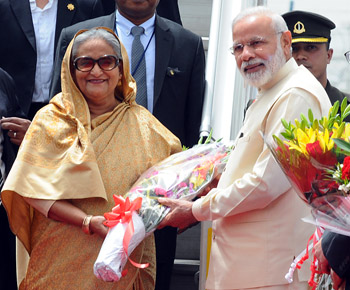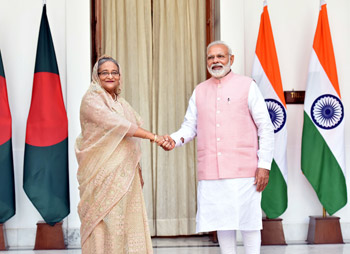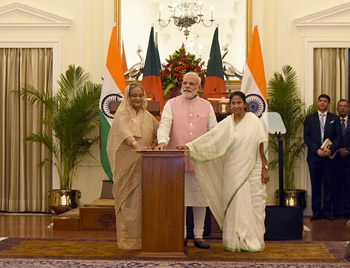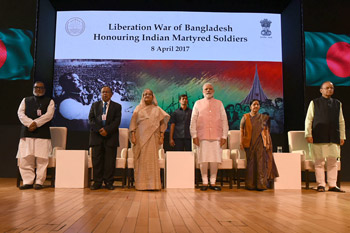INDIAN ARMED FORCES CHIEFS ON
OUR RELENTLESS AND FOCUSED PUBLISHING EFFORTS

SP Guide Publications puts forth a well compiled articulation of issues, pursuits and accomplishments of the Indian Army, over the years

I am confident that SP Guide Publications would continue to inform, inspire and influence.

My compliments to SP Guide Publications for informative and credible reportage on contemporary aerospace issues over the past six decades.
- Interim Defence Budget 2024-25 — An Analysis
- Union Defence budget 2024
- Indian Army: In quest of greater firepower and policy recommendations for gaps
- Indian Army Annual Press Conference 2024
- 6G will transform military-industrial applications
- Tata Boeing Aerospace Delivers 250 AH-64 Apache Fuselages, Manufactured in India
Indo-Bangla relations at all time high — Teesta should be next step
 |
By Lt. General P.C. Katoch (Retd) Former Director General of Information Systems, Indian Army |

Minister of Bangladesh, Sheikh Hasina, on her arrival, at Air
Force Station Palam, in New Delhi on April 07, 2017

Bangladesh, Sheikh Hasina, at Hyderabad House, in New Delhi
on April 08, 2017

Bangladesh, Sheikh Hasina and the Chief Minister of West
Bengal, Mamata Banerjee at Hyderabad House, in New Delhi

Bangladesh, Sheikh Hasina at Sommanona Ceremony to salute
Indian Soldiers who fought in 1971 war, in New Delhion April 08,
2017. The Union Minister for Finance, Corporate Affairs and
Defence, Arun Jaitley, the Union Minister for External Affairs,
Sushma Swaraj and other dignitaries are also seen
The four day visit of Bangladesh Prime Minister Sheikh Hasina (April 7-10) has taken Indo-Bangladesh relations to an all time high. Just before her visit, Bangladesh Foreign Minister AH Mahmood Ali had said, "The relation between the two countries has reached a new height." At New Delih, Prime Minister Narendra Modi received Sheikh Hasina at the airport. President Pranab Mukherjee said Bangladesh and India have succeeded in enhancing and intensifying their cooperation in areas of two countries' shared interest, while PM Modi described India as a "strong ally and good friend" of Bangladesh. The two Prime Ministers held bilateral talks and signed 22 agreements in various key sectors, including a civil nuclear agreement and two memorandums of understanding (MoUs) on defence cooperation. India has extended a credit line of $4.5 billion for implementation of projects in Bangladesh. PM Modi announced a concessional line of credit of $4.5 billion for investment in priority sectors in Bangladesh, as also a $500 million credit line towards our eastern nation's military budget.
The 22 MoUs signed included: Defence Cooperation Framework; between India's Defence Services Staff College and Dhaka's Defence Services Command and Staff College for Enhancing Cooperation in the Field of Strategic and operational studies; between Dhaka's National Defence College and India's National Defence College for enhancing cooperation in the field of national security, development and strategic studies; cooperation in the peaceful uses of outer space; peaceful uses of nuclear energy; exchange of technical information and co-operation in the Regulation of Nuclear Safety and Radiation Protection; cooperation regarding Nuclear Power Plant Projects in Bangladesh; field of Information Technology and Electronics; cooperation in the area of Cyber Security; establishing Border Haats across India and Bangladesh border; Bilateral Judicial Sector Cooperation; Training and Capacity Building Program for Bangladeshi Judicial Officers in India; cooperation on aids to navigation; Mutual Scientific Cooperation in the field of Earth Sciences for R&D; passenger and cruise services on the coastal and protocol route; development of Fairway from Sirajganj to Daikhowa and Ashuganj to Zakiganj on Indo-Bangladesh Protocol Route; cooperation in the Field of Mass Media. Companies of both countries signed pacts worth over $9 billion aimed at deepening partnership in various sectors, including power, oil and gas. These included: facility agreement between Bangladesh India Friendship Power Company (BIFPCL) and Exim Bank of India for debt financing for construction of 1,320 mw Maitree Power Project in Rampal in Bangladesh ($1.6 bn); implementation and power purchase agreement between Reliance Power and the ministry of power, energy and mineral resources for the first phase (718 mw) of the 3,000 mw power project at Meghnaghat, entailing $1 billion (out of a total proposed investment of $3 billion); agreement between NTPC Vidyut Vyapar Nigam (NVVN) and Bangladesh Power Development Board for supply of power from Nepal envisaged an investment of $3.15 billion; pact between Adani Power (Jharkhand) and the Bangladesh Power Development Board entailing an investment of $2 billion and a power purchase agreement between Adani Power (Jharkhand) and Power Grid Company of Bangladesh; LNG terminal use between Petronet LNG, India and Bangladesh Oil, Gas and Mineral Corporation (Petrobangla). Agreement on sharing of Teesta River waters, which Sheikh Hasina was apparently looking forward to, however, did not materialize.
Though PM Modi did reiterate the his government's strong resolve to conclude the water sharing treaty soon, Sheikh Hasina said the resolution of the long-pending Teesta water-sharing issue would transform bilateral ties with India, adding "Once it happens, the face of Indo-Bangladesh relations would undergo another transformation. We strongly believe our common water resources must act as a uniting force. A comprehensive, basin-wide solution with in-built solution to water sharing of all common rivers holds the key to our common future". Speaking on her interaction with West Bengal Chief Minister Mamata Banjerjee on the issue, Sheikh Hasina said, "In my talks with her she gave a new twist, but Modiji has assured that we are here to look after it. We had asked for water but she is giving us electricity. At least we got something." Apparently, an agreement on sharing of the Teesta waters was drafted ahead of then PM Manmohan Singh's visit to Bangladesh in 2011, but was withdrawn last moment because of protests by Mamta Banerjee. Teesta's floodplain covers some 2,750 sq kms in Bangladesh; catchment area supporting 8.5% of its population (some 10 million) and 14% of crop production. Over one lakh hectares of land across five districts are severely impacted by upstream withdrawals of Teesta's waters in India and face acute shortages during the dry season. Mamta's position is that the treaty would render north Bengal dry and affect farmers. During her February 2015 Dhaka visit, Mamta promised to play a "positive role" in resolving the outstanding issue, protecting interests of both Bangladesh and West Bengal. Ironically, federal political dynamics has prevented the Modi government from resolving the issue of water-sharing. It is essential to speedily resolve this sticking sore point. Surely the Centre would not take decisions that put the farmers of West Bengal to disadvantage. Besides, federal politics is internal wrangle of India and Indo-Bangladesh relations should not be hostage to a stubborn CM. There is no doubt that Sheikh Hasina has been the best friend of India, also going all out against terrorist networks that has a direct bearing on India. It would be good if the Modi Government is able to push through a mutually beneficial Teesta Water Sharing Agreement before the general elections in Bangladesh in 2018. That would really take Indo-Bangladesh relations to the next level.





